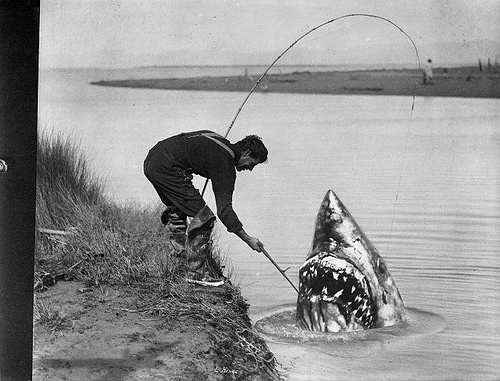I think someone literally shoved a pile of books in my hand this fall. I think I was stooped and looking at his stuff – Here, take em, he growled like I might be a little too shy to accept this gift. Most of them I owned and I deposited the books on one of those ledges that surround little peed-on trees in the east village. But I kept the wreckiest of the bunch – Herman Melville’s selected poems. Mostly because of its beauty.
It had an aged mossy green cover with reddish brown type. Melville’s name was highlit darkly to give him heft like he needs it. The pamphlet was edited by F.O. Matthiessen, is slim and Matthiessen’s introduction makes it all seem slimmer still – he says exactly the things that would break a writer’s heart & he says them kind of beautifully & succinctly. He makes it clear that Melville turned to poetry after accepting he would not make a living as a writer, after Moby Dick and all the rest maybe with the exception of Billy Budd which no one read till after he was dead. Melville got a job as a custom’s inspector and he wrote these poems. One of the longest of the bunch “Clarel” Melville himself described as “immensely adapted for unpopularity." Matthiessan says “the reward that awaits the reader who follows these selections . . . is the frequency with which his mediocre poems are illuminated by passages where the poet is in supreme control.” Matthiessen explains then that the goal of this selection is in part to “release such passages from their hampering surroundings.” He’s sort of right but the pain of course is reading it in print rather than experiencing it for yourself. It feels like Matthiessen is apologizing for Herman’s boo-boos by showing us what he knows.
I find myself looking at this:
THE TUFT OF KELP
All dripping in tangles green, Cast up by a lonely sea, If purer for that, O Weed, Bitterer, too, are ye?
I love the word ‘All’ beginning this poem. When I was in high school and I don’t know if it was a regionalism or an idiolect of my exact mid-60s kid gang - class and all that, but when someone wanted to laugh at someone else – say the person was apparently feeling pretty good, the other kid would go: Look at Fitzie -- all proud. It was such a tough mean way of laughing at excess. To me that ‘all’ feels like an antique use of the word. It’s a growly ‘all’, not breathy. Anyway because of the particularity of my experience with this word I charged right into this poem with a readiness to accept it on its immediate terms, not just poetic, which here means old.
All dripping in tangles green.
Err, and what about that inverted word use at the end. Well if you read it as a nickname or a location instead - like a housing development or a nursery that also served drinks then it’s okay. When advertising picks up on the inversions of 19th c. poetry -- as a way to class up the real estate I think well why can’t we also enjoy the bracing gravity of the refurbished old usage. That’s how I love this line: All dripping in tangles green. Don't you agree. It sings.
“Cast up by a lonely sea.”
This one’s quick, almost unnoticeable line, nearly straight ahead. But it does make the sea be the fisherman throwing the human back. It gives us Melville sitting at his desk, thinking O what a wash-ashore am I! Oddly “lonely” here sounds like the fuller place, wide and alive.
“If purer for that, O Weed.”
I enjoy the fact of something low, lowly, a weed being spoken to and really how often do we remember that seeweed is a weed. To drop the sea here is to see it. And on closer observation the weed is not really being addressed so grandly, because though told it’s purer, there’s such a warning in the line – and because it’s a short poem, we can feel it coming before we read - and “purer” is preceded by “if” so it’s an ironic purity, it’s not so great, weedy, you got yourself a fine long oceanic bath, O, it makes no difference my friend, but may I call you weed-O?
Bitterer too, are ye?
Well this is mostly a mouth-pleasure line. A pirate leans over to you in a bar and asks of you who are undoubtedly a person going down for the third time, about to land on the floor, legs still shaking, consciousness almost gone.
Bitterer too, are ye?
One would be unable to say bitter-er if not for the place-holding “too”, its ‘t’ operating like a piece of furniture when you needed a hand-hold.
Are ye – and this is my favorite part. Think of how ‘you’ is actually sonorous, dignified, even a little mournful, round like a small tub. How are you. Almost sexy, a kiss. ‘Ye’ on the other hand is glandular. You use the back of your throat, you use the sides of your mouth, it’s an animal sound, a calling to the human in a bridle, it restrains and squeaks through its restraint so the pain in ‘ye’ at the end of the poem, written at his desk and not at sea, sucks.
Eileen Myles was born in Cambridge, Massachusetts, and was educated at the University of Massachusetts...
Read Full Biography


